DOGS HELPING PEOPLE
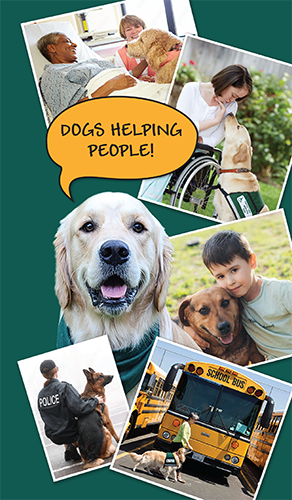
FIRST, HERE'S OUR "DOGS HELPING PEOPLE!" BROCHURE
We’ve designed a DOGS HELPING PEOPLE! brochure to help you the understand some of the differences between:
Service Dogs
Therapy Dogs
Facility Dogs
Emotional Support Animals
Working Dogs
DOGS HELPING PEOPLE Brochure (COLOR, a pdf file)
DOGS HELPING PEOPLE Brochure (GRAYSCALE, a pdf file)
DEFINITIONS OF DOGS TRAINED TO HELP PEOPLE
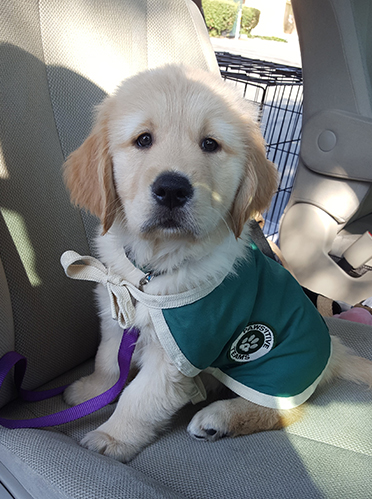
SERVICE DOGS
Service Dogs are legally defined (Americans With Disabilities Act, 1990) and are trained to meet the disability-related needs of their handlers who have disabilities. Federal laws protect the rights of individuals with disabilities to be accompanied by their service dogs in public places. Service dogs are not considered ‘pets’. These dogs are individually trained to do work or perform tasks for the benefit of an individual with a disability, including a physical, sensory, psychiatric, intellectual, or other mental disability. The work or tasks performed by a service dog must be directly related to the handler’s disability. The crime deterrent effects of a dogs presence and the provision of emotional support, well-being, comfort, or companionship do not constitute work or tasks for the purposes of this definition.
Examples of work or tasks include, but are not limited to, assisting individuals who are blind with navigation and other tasks, alerting individuals who are deaf to the presence of people or sounds, pulling a wheelchair, assisting an individual during a seizure, alerting individuals to the presence of allergens, retrieving items such as medicine or the telephone, providing physical support and assistance with balance and stability to individuals with mobility disabilities, and helping persons with psychiatric and neurological disabilities by preventing or interrupting impulsive or destructive behaviors.
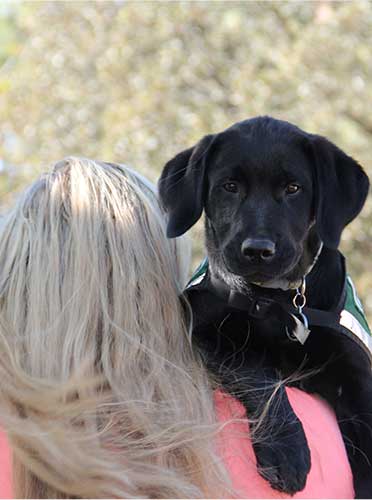
Therapy Dogs
Therapy Dogs are not legally defined by federal laws. They provide people with contact to dogs, but are not limited to working with people who have disabilities. They are usually the personal pets of their handlers, and work with their handlers to provide services to others. Federal laws have no provisions for people to be accompanied by therapy animals in places of public accommodation that have “no pets” policies. Therapy dogs are given basic obedience training and then tested for both obedience and temperament. Once they pass a therapy dog test with their partner, they can be registered with a therapy dog organization. Registration offers several benefits both to volunteers and to the facilities they visit.
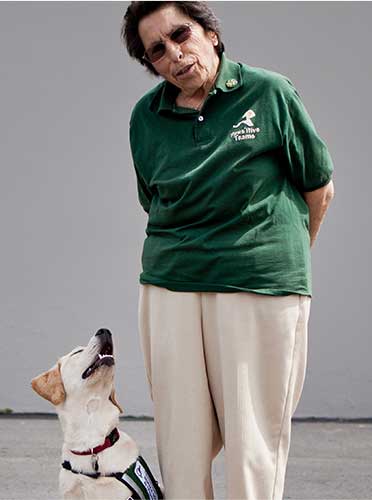
Emotional Support Dogs
Emotional Support Dogs provide therapeutic support to disabled or elderly owners through companionship, non-judgmental positive regard, affection, and a focus in life. Emotional support dogs are allowed in public housing but do not have public access rights as guaranteed by the Americans With Disabilities Act (ADA). They are not necessarily task trained like service dogs and are generally required to be reasonably well behaved by pet standards. This means that the dog is fully toilet trained and has no bad habits that would disturb neighbors such as frequent or lengthy episodes of barking. The dog must not pose a danger to other tenants or to workmen.
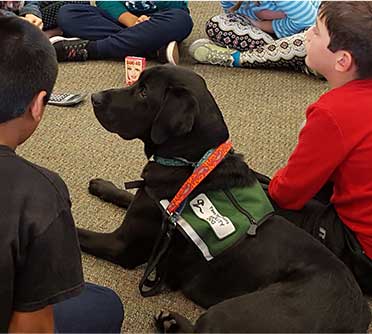
FACILITY DOGS
Facility Dogs are assigned to professionals who use the dog in the workplace to accomplish client related goals. These dogs generally live with their handler who is also the professional. Public access for these dogs is only in the work environment when accompanied by the professional handler.

COMPANION DOGS
Companion Dogs are not legally defined, but generally considered pet dogs.
ASSISTANCE DOGS INTERNATIONAL (ADI)
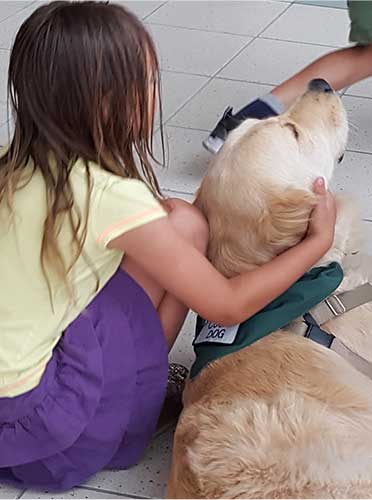
Assistance Dogs International, Inc. is a coalition of not for profit organizations that train and place Assistance Dogs. The purpose of ADI is to improve the areas of training, placement, and utilization of Assistance Dogs as well as staff and volunteer education. Members of ADI meet regularly to share ideas, attend seminars, and conduct business regarding such things as educating the public about Assistance Dogs, and the legal rights of people with disabilities partnered with Assistance Dogs, setting standards and establishing guidelines and ethics for the training of these dogs, and improving the utilization and bonding of each team.
If you want information about how to get an assistance dog, please go to ADI’s Member Programs List and Links and you will see the options for viewing the membership lists. Each ADI member has their own guidelines and processes for assistance dog applicants. Please contact programs directly so they can talk with you about your specific needs.
FEDERAL GOVERNING BODIES
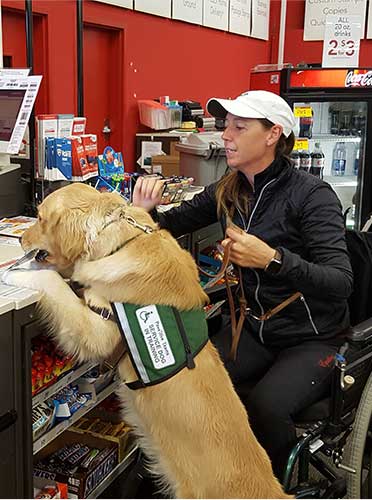
Americans with Disabilities Act (ADA)
ADA Subpart A 36.104 Definitions – Final Rule Title III
Service animal means any dog that is individually trained to do work or perform tasks for the benefit of an individual with a disability, including a physical, sensory, psychiatric, intellectual, or other mental disability. Other species of animals, whether wild or domestic, trained or untrained, are not service animals for the purposes of this definition. The work or tasks performed by a service animal must be directly related to the handler’s disability. Examples of work or tasks include, but are not limited to, assisting individuals who are blind or have low vision with navigation and other tasks, alerting individuals who are deaf or hard of hearing to the presence of people or sounds, providing non-violent protection or rescue work, pulling a wheelchair, assisting an individual during a seizure, alerting individuals to the presence of allergens, retrieving items such as medicine or the telephone, providing physical support and assistance with balance and stability to individuals with mobility disabilities, and helping persons with psychiatric and neurological disabilities by preventing or interrupting impulsive or destructive behaviors. The crime deterrent effects of an animal’s presence and the provision of emotional support, well-being, comfort, or companionship do not constitute work or tasks for the purposes of this definition.
The work or tasks performed by a service animal must be directly related to the handler’s disability. A public accommodation may ask an individual with a disability to remove a service animal from the premises if the animal is out of control and the animal’s handler does not take effective action to control it or if the animal is not housebroken. A service animal shall be under the control of it’s handler. A service animal shall have a harness, leash or other tether.
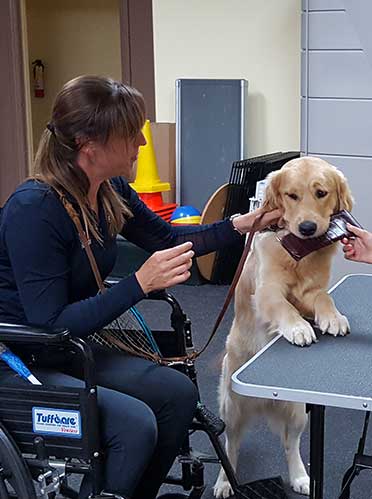
Housing and Urban Development (HUD)
The Fair Housing Act does not define “service animal” per se, and does not make a distinction among certified service animals, non-certified animals, animals that provide psychological support, and service animals in training that live with the people with disabilities for whom they will work. The Act does not have restrictions about who may train the animal. However, the Act recognizes that service animals are necessary for the individuals with disabilities who have them, and as such does not categorize service animals as “pets.” Service animals, then, cannot be subjected to “pet rules” that may be applied by housing providers to companion (non-service) animals. Housing providers cannot, for example, impose upon service animals the size or weight restrictions of a pet rule, exclusions from areas where people are generally welcome, or access restrictions to only a particular door or elevator. Further, special tags, equipment, “certification” or special identification of service animals cannot be required. Check the HUD website for additional information. http://www.hud.gov
